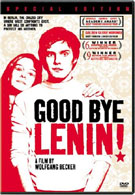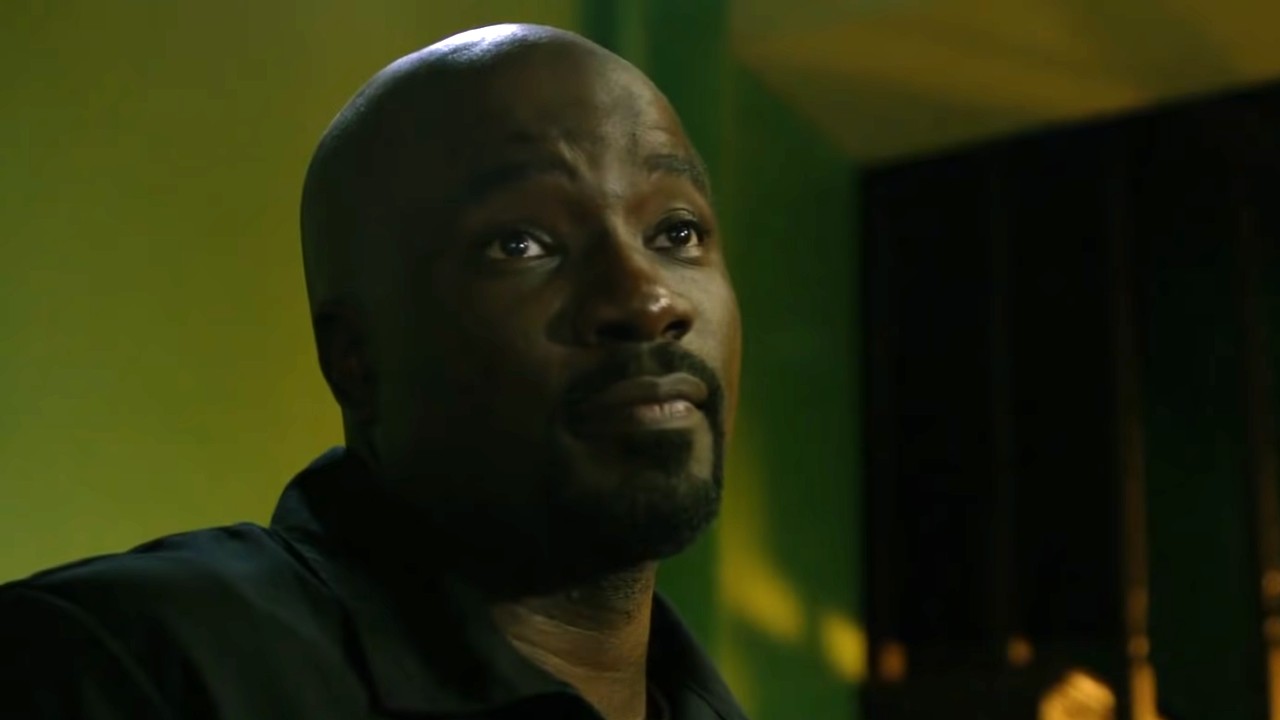Have you ever lied to keep secret from a parent? You know, one of those situations where you know they’ll be better off if they don’t know about it? I’m not talking about the times where you know you’ll be better off if they don’t know about. Everybody has those. No, I’m talking about something that could very well kill your parents if they found out. If you have had such an experience, you’ll relate to the story and humor behind the German film, Good Bye, Lenin. If you haven’t, you should see it anyway. American movie goers haven’t been treated to anything this honest or original in years. East Germany was a tough place to grow up for a lot of kids. Particularly for those whose fathers escaped from the highly controlled socialist state only to run straight into the waiting arms of capitalist whores. Such was the life of Alex (Daniel Bruhl), his sister (Maria Simon) and their mother (Katrin Sass). Abandoned by her husband, Alex’s mother becomes, as he puts it, “married to our socialist fatherland. Since the relationship was not sexual, she had a lot of energy for us kids…” But despite all efforts by their mother to raise the perfect socialist children, Alex and his sister share little love of their mother’s Leninist philosophies.
Alex’s presence at an anti-socialism rally leads to his mother suffering a terrible heart attack which leaves her comatose for eight months. Unfortunately, those eight months happen to coincide with the fall of the East German socialist regime as the Berlin Wall became a part of “a huge and unique recycling campaign.”
When his mother finally awakens, the world has completely changed and her children have happily gone right along with it. Alex is assured by her doctors that any excitement could lead to a second fatal heart attack. Terrified that the revelation of her father country’s sudden demise would surely do his mother in, Alex sets out in a feverish campaign to hide all the new capitalist changes going on around her. At the same time, Alex fights to not have to put his own life on hold to protect his mother. Just his luck that he happens to fall in love with his mother’s nurse (played by the enchanting Chulpan Khamatova – the German Natalie Portman). Everything seems manageable so long as mother is bedridden. But the ‘medication-may-have-hallucinogenic-side-effects’ excuse only lasts so long.
I suspect that unless you actually lived in Germany (East or West) in 1989, a lot of the social and political significance of what is happening in this movie will be lost on you. I know I couldn’t relate to the difficulties of driving around town trying to find a jar of Spreewald Pickles (although some of you fathers-to-be might if your significant other ever sent you on a quest to satisfy some strange midnight craving). But even without the direct experience, you won’t feel too lost. The film doesn’t get too caught up in those details. Instead it focuses on the things that everyone can relate to, like protecting loved ones, falling in love, dealing with rejection, struggling to find purpose in one’s life, and what to do when you accidentally unplug the I.V. drip from your comatose mother.
While chock full of political jabs and wonderfully dry tragicomedy, the movie has at its heart a very touching story. Throughout the movie you begin to figure out that Alex isn’t the only one lying. And in fact, the movie focuses on the lies we tell ourselves and each other just to get through life. It’s a series of twisted, beautiful, collapsing, philanthropic efforts set fittingly against the crumbling world of a twisted, collapsing socialist nation.
While having excellently translated dialogue, there’s no crappy dub-over to this movie (thank goodness). If you don’t speak German and absolutely abhor having to read subtitles, steer clear of this one. Personally, I hate it when people say they don’t like a movie because they had to read the words, and this movie is too good to have such pedants disparaging it. Otherwise, this picture is worth a quick visit to your local Blockbuster store or Netflix.com queue. With all its historical references (and being a foreign film and all) you might even feel a little smarter after seeing it. So grab a jar of Spreewald pickles (that’s shpreevahld, kids), and enjoy. There are plenty of extras to enjoy with this movie. There’s a director’s commentary as well as an actor commentary to dig in to. The commentary audio is, of course, in German, but there are subtitles. Since the subtitles are independent of the audio, you can have the film’s regular audio running while watching the subtitles of the commentary. It’s kind of like watching pop-up video without the cheesy 90’s visuals. The thoughts and insights shared in the commentaries make it worth watching the film at least twice, preferably three times, especially if you’re interested in learning more about the history of events in the movie.
The deleted scenes really are full scenes of the film that were removed. There’s almost 15-20 minutes of footage to see there, all of which is well acted and very relevant either to the story or the characters. The reasons for their removal are well explained in the commentary, but I wish that there were some function to insert them back into the film to watch an “original cut” version. They’re excellent moments in the story and well worth the time to watch.
Your Daily Blend of Entertainment News
Also included is a truly fascinating featurette on the visual effects used in the film. The segment, titled “Lenin Lernt Fliegen” (Lenin Learns to Fly), takes its name from the film’s stunning sequence where a broken statue of Lenin, carried by helicopter, floats down the middle of Berlin past Alex’s very disillusioned mother.
The director and co-author, Wolfgang Becker, shares his perspective in the feature: “What’s special about the film is that you don’t see the effects. It would be terrible if you could see them, because it is a movie in which the digital effects help to create a time that no longer exists.” And it’s true. Lucas could stand to take a page or two from Becker. By the time the featurette is through you’ll be amazed by the detailed attention given to making this movie match the East Berlin of 1989. As well, you’ll appreciate just how hard the director worked to make you unaware of the effects and allow you to enjoy the story and actors instead. (If you’re George Lucas, go back and read that last sentence one more time).
The disc has a few other add-ins to round out the package. All in all, for foreign film fans Good Bye, Lenin is an absolute must own. For everyone else, don’t just watch the movie before sending it back to the rental store. Give the extras a chance as well.

